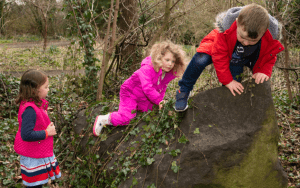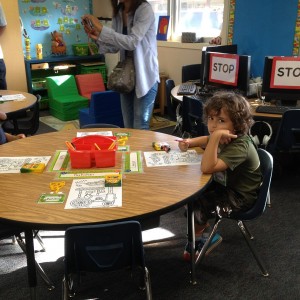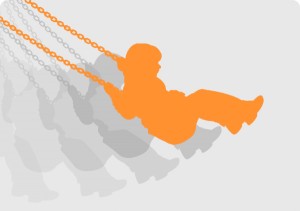Why do we need a kindergarten stage?
International evidence shows that children under the age of seven benefit from an educational approach that supports their all-round physical, emotional, social and cognitive development, rather than pushing them towards early academic achievement.
In the long run a kindergarten stage enhances academic results. In the 2015 OECD international review, the three most successful western nations were Finland, Estonia and Switzerland. All have a play-based kindergarten stage for three- to seven-year-old children.
There’s no educational advantage to an early start. Research has found that children who are taught literacy skills from the age of five do no better in the long run than those who start at seven – results even out by the time they’re in double figures.
On the other hand, an early start causes problems for many children. Many research studies have now linked an early start on formal education to social, emotional and mental health problems as the years go on. An increasing number of Scotland’s children and young people now suffer from developmental disorders and mental health conditions. While the reasons behind these problems are complex, we can’t ignore the impact of early pressure for academic achievement.
What does kindergarten look like?
The emphasis is on opportunities for children to play (especially outdoors) along with the development of social and communication skills, and teacher-led opportunities for art, drama, music, science/maths investigations and listening to stories. It’s learning through enjoyable experiences rather than formal teaching.
Time and space for play is vital for physical and mental health. Many young children today spend little time in the active, creative, outdoor play that supports all-round healthy development – instead they’re more likely to be watching TV or playing electronic games. A kindergarten stage could give all Scottish children time and space to develop the habits of play that promote mental and physical health and well-being.
During the first seven years, children’s own self-directed play underpins the development of:
- physical health, including bodily control and coordination and physical self-confidence
- personal qualities, including creativity, resilience, self-control and problem-solving skills
- social skills such as getting along with other children, communication skills and understanding of the importance of rules in working collaboratively
- cognitive capacities like the use of language to explore and express ideas, and ‘common-sense understanding’ of the world and how it works, which underpins mathematical and scientific abilities.
But what about Education?
 Play is the inborn human learning drive. It’s a tried-and-tested way of preparing children to be successful lifelong learners. Music, art, drama, stories, songs and rhymes develop young children’s listening, language, memory and thinking skills, which are essential for good literacy skills. Active, creative play develops the problem-solving skills and conceptual understanding required for maths and science.
Play is the inborn human learning drive. It’s a tried-and-tested way of preparing children to be successful lifelong learners. Music, art, drama, stories, songs and rhymes develop young children’s listening, language, memory and thinking skills, which are essential for good literacy skills. Active, creative play develops the problem-solving skills and conceptual understanding required for maths and science.
No child is ‘held back’ in kindergarten education. Those who show an interest in reading, writing and maths are individually supported at their own level, but no child is forced to make a start if not ready to do so. That way, when children do start formal schooling, they’re much more likely to succeed.
A later start can help close the attainment gap. At present, children from disadvantaged homes are often less well-prepared for formal learning than other youngsters. A kindergarten stage gives all children time and sensitive adult support to develop the capacities and skills that underpin educational success and lifelong learning. It would provide a genuinely ‘level playing field’ for all Scotland’s children.
It could also help close the gender gap. Boys tend to lag behind girls in terms of ‘school readiness’, so a later start on formal schooling should help level the educational playing field for them too. Girls would benefit from more time to develop physical and emotional strengths through play (see above), which should promote gender equality in the long-term.
If kindergartens are so good, why don’t we have them already?
We’re trapped by history and tradition. In 1870, the English parliament chose an early school starting age so children’s mothers could provide cheap labour in factories. Scotland followed suit, and ever since we’ve taken it for granted that formal education must start at five. (Only 12% of countries worldwide start children at school so early – and all bar one are ex-members of the British Empire.)
This means Scottish children get only two years at nursery before starting school. Although Curriculum for Excellence stresses developmentally-appropriate teaching methods, cultural expectations of ‘schooling’ mean the pressure for academic achievement usually begins in Primary One – and (due to the influence of current US and English educational policies) sometimes even earlier.
It’s time to change. Scotland has a long tradition of high-quality early years provision, and our EY teachers are trained in the same principles as those in the successful European systems. We could build on this expertise – and lessons from countries like Finland – and extend the EY educational ethos for a further two years.
Upstart does not want to see any change in terms of children’s entitlement to state-funded education. The change we are calling for is a change in the ethos of education for three- to seven-year-olds.
Not only would this ensure that schools abide by the principles of Curriculum for Excellence and Getting It Right For Every Child; it could also help change cultural attitudes to early education and raise awareness of the vital importance of play.
All research cited in this section can be found in the Evidence page of the Upstart website.
We are an alliance of parents, early years practitioners, teachers, playworkers, health and social work professionals and others concerned about the education and well-being of Scotland’s next generation.
Please register to receive updates on Upstart
For more information, contact info@upstart.scot or send an SAE to Upstart, 43/5 Thistle Street, Edinburgh, EH2 1DY




